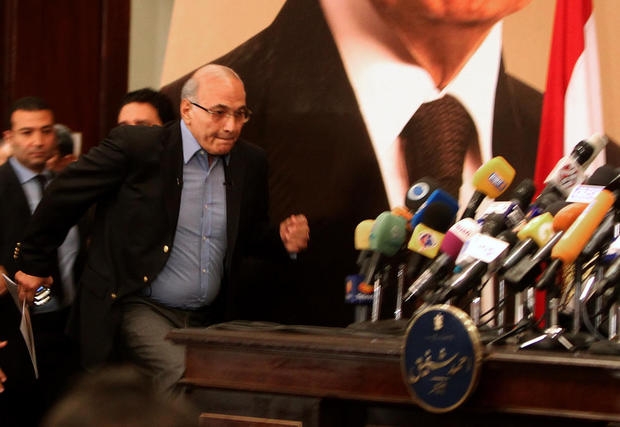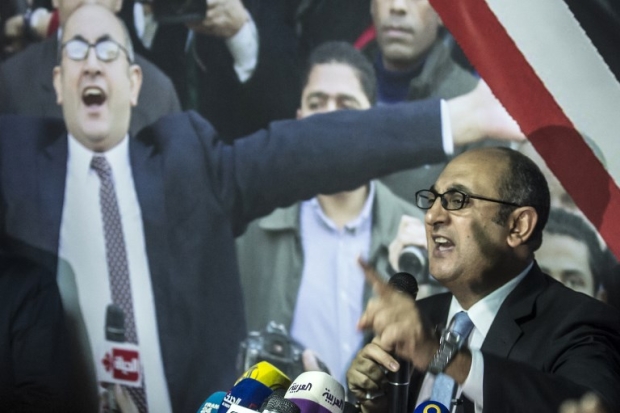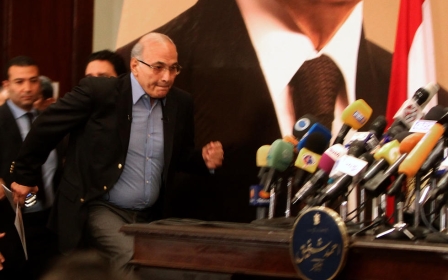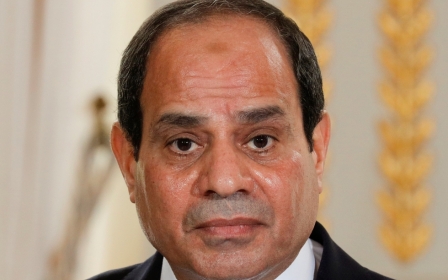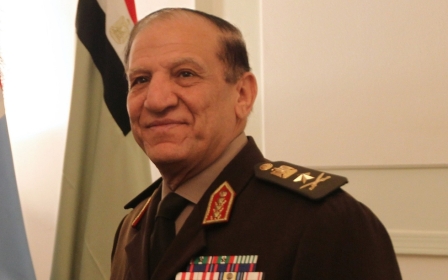'Politics is dead': Egyptians find little reason for optimism in new elections
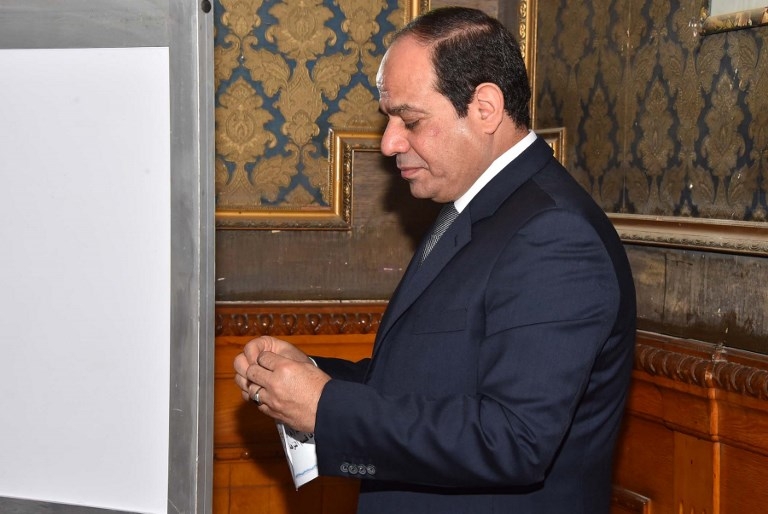
Looking back, Mohamed Hamdi, a taxi driver in his early 40s, now says he was "overzealous" in his support for the new president, Abdel Fattah al-Sisi, when he secured a landslide win in Egypt’s presidential elections little more than three years ago.
"I had high hopes he would heavily improve this battered economy after many years of instability. Today, I just want him to lose and leave the presidency, but only God knows when this might happen," he told Middle East Eye during a ride in central Cairo.
"But, no, I don't think there is any chance he could leave in the coming presidential elections," he said, shaking his head.
Hamdi was one of dozens of Egyptians interviewed by MEE who said they had doubts that there will be any meaningful competition in new elections slated for March.
I just want him to lose and leave the presidency, but only God knows when this might happen
- Mohamed Hamdi, taxi driver
Army general-turned-president Sisi has yet to formally announce that he would seek a second term, although he is widely expected to do so.
New MEE newsletter: Jerusalem Dispatch
Sign up to get the latest insights and analysis on Israel-Palestine, alongside Turkey Unpacked and other MEE newsletters
So far any possible challenges to his rule seem far-fetched. Ahmed Shafiq, a veteran army lieutenant general, was expected to provide a stiff opposition to Sisi when he announced that he would run for president in late November, only to backtrack last week.
Shafiq abandoned his presidential after being told that he would be smeared with allegations of sexual misconduct and corruption, sources close to the former prime minister told MEE.
Shafiq's sudden withdrawal, which he announced almost a month after he returned to Cairo from the United Arab Emirates where he had resided since narrowly losing to Islamist president Mohamed Morsi in 2012 elections, came against the backdrop of what seemed a smear campaign against him orchestrated by pro-state media.
"I'm not a Shafiq supporter, but I would have definitely voted for him had he decided to run," said Youssef Remon, a 27-year-old bank employee in Cairo's upscale district of Zamalek.
"After what happened with him, it's clear to me the state has no intention of holding free and fair elections. Their continued oppression of any dissenting voices, even those coming from the army ranks such as Ahmed Shafiq's, makes it impossible for anyone to contest the elections," he added.
"If they have done that with someone as Shafiq, what would they do with [other potential candidates] Khaled Ali and Mohamed Anwar El-Sadat? I really don't care any more. The result is known to everybody, so what's the use of holding elections?" he said.
Young aspirations
Rights lawyer Khaled Ali, an outspoken critic of Sisi's policies, is one potential candidate.
However, doubts linger over whether the 45-year-old will be able to overcome two main obstacles to take a second shot at the presidency, having also taken part in the 2012 elections, which marked Egypt's first multi-candidate vote since the 2011 uprising toppled autocratic leader Hosni Mubarak.
A tight timeframe announced by Egypt's National Elections Authority leaves Ali with a little under three weeks to get either the backing of 20 parliamentarians or the written endorsements of 25,000 eligible voters in at least 15 governorates before 29 January to register his candidacy, as stipulated by the law.
He will still be ineligible to run if a Cairo court upholds a three-year prison sentence handed to him last year for making an obscene gesture outside the State Council headquarters in January 2017. The court will hear his appeal in the case on 7 March.
A handful of youths interviewed by MEE said they were eager to endorse Ali, but not primarily because they believe he might have a chance of unseating Sisi.
"He will most probably fail to win the elections, but I just want to give him a chance," said one of them, a 21-year-old law student who did want to give his name.
"Who knows? If Khaled Ali enters the elections this might at least throw stones into a still pond. It might be merely the first step in a long road to force any changes in the current system."
Ali lamented what he called an "unjust competition" with Sisi during a news conference on Thursday to confirm his plans to run for president, citing some irregularities in the election procedures and hinting that the state is throwing its weight behind Sisi.
However, he said he was determined to carry on.
One of them could be used by the state to make it appear as if there is real competition
- Hossam Fekry, accountant
Other potential candidates include former military chief of staff Sami Anan, who along with former defence minister Hussein Tantawi led Egypt's transition following the 18-day revolt in 2011, and politician Mohamed Anwar El-Sadat, the nephew of late president Anwar Sadat.
"I doubt that any of them will be able to get the necessary votes to run in the elections. But it remains a possibility that one of them could be used by the state to make it appear as if there is real competition," said Hossam Fekry, a 33-year-old accountant in Cairo's Maadi district.
Economy at the fore
Although there are no accurate figures to gauge Sisi's popularity, many voters said the huge support he once had has notably declined because of dire economic conditions and at times record high inflation as Egypt embarked on a series of painful measures as part of an economic reform programme to bridge a ballooning budget deficit.
A flotation of the pound in November 2016 kicked off the reform programme, with Egypt securing a $12bn three-year loan from the International Monetary Fund to boost an ailing economy.
With the Egyptian pound falling sharply against the US dollar and the state moving to gradually lift energy and electricity subsidies, prices skyrocketed. Sisi said such measures were long overdue.
Inflation, which reached a record high of 35 percent in July, has recently eased, with credit rating agency Standard and Poor's raising its Egypt outlook to "positive" from "stable" last November, highlighting an increase in foreign exchange reserves and the strengthening of economic growth.
However, many voters said they are not convinced by any "positive" ratings, as long as they are still struggling on a day-to-day level.
"They usually say that, on paper, everything is getting better in the economy, but we do not feel the huge improvement that they are talking about," said Salah Bayoumi, a 50-year-old government employee.
Politics is dead now and it doesn’t matter. The only thing that matters is that we have better living conditions. That's why I want Sisi replaced
- Salah Bayoumi, government employee
"For me, all I need from the incoming president is to lift the country from its current economic state.
"Politics is dead now and it doesn't matter. The only thing that matters is that we have better living conditions. That's why I want Sisi replaced."
MEE's interviews with voters suggest that Sisi still retains considerable support among many of the elderly, but few expressed an interest in going to the polls, tabled for 26-28 March.
"I don't think I need to go and vote for Sisi this time around. I do support him, but the race seems settled, so why should I go?" said Mohamed Hussein, a 63-year-old pensioner in Zamalek.
"I don’t feel that any candidate is threating Sisi's rule. It's over."
Middle East Eye delivers independent and unrivalled coverage and analysis of the Middle East, North Africa and beyond. To learn more about republishing this content and the associated fees, please fill out this form. More about MEE can be found here.


